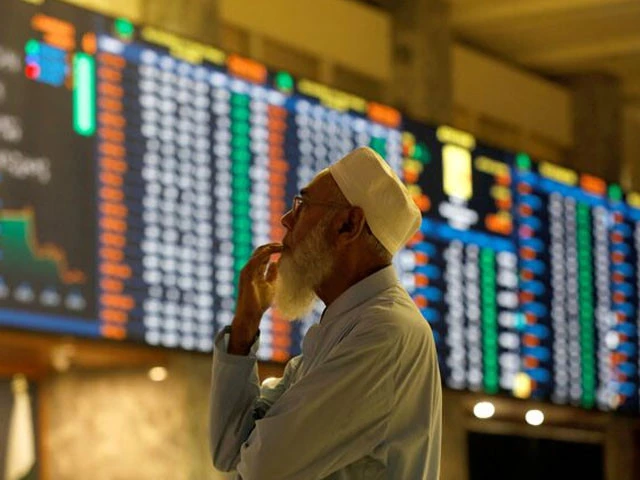Business
PSX extends losing streak as index plunges 2,062 points | The Express Tribune

A stock broker reacts while monitoring the market on the electronic board displaying share prices during trading session at the Pakistan Stock Exchange, in Karachi on July 3, 2023. Photo: Reuters/ File
The Pakistan Stock Exchange (PSX) witnessed a sharp downturn on Tuesday as early gains were wiped out by heavy profit-taking and weak investor sentiment, pushing the benchmark index deep into the red.
After opening on a positive note, the KSE-100 index climbed to an intra-day high of 163,380.67 points. However, momentum quickly reversed in the second half as investors booked profits from recent rallies. The index hit a low of 159,805.35 points before closing at 160,101.03, down 2,062.78 points or 1.27% from Monday’s close of 162,163.81.
Tuesday’s slump marked the fifth consecutive session of losses, underscoring persistent investor unease. The benchmark briefly dipped below the 160,000-point mark amid sustained selling pressure and a lack of positive triggers.
Read: Border clashes rattle stocks and PSX suffers major sell-off
Market participants attributed the downturn to fading confidence, macroeconomic uncertainty, and caution ahead of corporate earnings, following recent policy announcements.
Arif Habib Limited (AHL) noted that the bearish spell persisted with the fifth straight down close and an intra-day breach of the 160,000 level. Only 19 scrips gained while 79 declined, with Lucky Cement (+1.67%), Pakistan Services (+1.69%), and Service Industries (+1.69%) providing the most support.
On the flip side, Hub Power (-2.18%), Meezan Bank (-1.82%), and Habib Bank (-1.9%) were the biggest drags on the index.
In corporate results, Lucky Cement reported its highest-ever quarterly consolidated profit after tax (PAT) of Rs21.9 billion (+23% YoY), translating into an EPS of Rs15.01 for 1QFY26.
Read More: PSX slips 0.3% as selling offsets early gains
Indus Motor Company (+0.92%) also posted a record PAT of Rs6.72 billion (EPS: Rs85.49, +32% YoY) along with a record quarterly dividend of Rs51 per share. Pakistan State Oil (+0.65%) announced 1QFY26 EPS of Rs20.0, up 136% YoY.
AHL cautioned that Tuesday’s declines wiped out all gains made since mid-October, warning that “after a bounce, the October lows will likely come under threat.”
Overall market participation improved, with 1.01 billion shares traded, up from 1.0 billion on Monday. Traded value stood at Rs36.94 billion.
Out of 476 active scrips, 113 advanced, 324 declined, and 39 remained unchanged. K-Electric led the volumes chart with 94.6 million shares, losing Rs0.54 to close at Rs5.27.
Business
Budget 2026: Cabinet gives green signal to Union Budget 2026–27

New Delhi: The Cabinet on Sunday approved the Union Budget 2026-27 during a meeting in Parliament chaired by Prime Minister Narendra Modi. A meeting of the Union Cabinet was held at Sansad Bhawan at 10 a.m., and after the Cabinet’s approval, Finance Minister Nirmala Sitharaman proceeded to Parliament to present the Budget.
Earlier, FM Sitharaman met President Droupadi Murmu and offered her a copy of the digital budget. The President also offered ‘dahi-cheeni’ (curd and sugar) to Sitharaman when she arrived at the Rashtrapati Bhavan. The Finance Minister was seen carrying her trademark ‘bahi-khata’, a tablet wrapped in a red-coloured cloth bearing a golden-coloured national emblem on it.
Minister of State for Finance Pankaj Chaudhary, Chief Economic Advisor Dr V. Anantha Nageswaran, Central Board of Direct Taxes (CBDT) Chairman Ravi Agrawal and other officials were seen accompanying the Finance Minister. Sitharaman was set to present her ninth consecutive Union Budget in the Lok Sabha. In 2021, she switched to using a digital tablet to carry the Budget papers, further promoting a modern and eco-friendly approach.
The ‘bahi-khata’ is a red pouch that holds the digital tablet containing the Budget documents. This year, Sitharaman opted for a deep maroon Kanjeevaram saree from Tamil Nadu. The saree featured a deep maroon base with a contrasting border and subtle gold detailing, paired with a yellow blouse.
The Budget is likely to strike a deft balance of sustaining growth momentum and maintaining fiscal consolidation. It also needs to address near-term challenges emanating from unprecedented geopolitical flux, said economists. According to economists, the budget is likely to focus more on capital expenditure, especially in sectors deemed to be strategically important owing to prevailing geopolitical compulsions.
While the FY26 Budget was more tilted towards stimulating middle-class consumption with tax reliefs, the FY27 Budget’s approach to stimulating consumption will be selective, they added.
Business
Education Budget 2026 Live Updates: What Will The Education Sector Get From FM Nirmala Sitharaman?

Union Education Budget 2026 Live Updates: Union Finance Minister Nirmala Sitharaman will present the Union Budget 2026–27 on February 1, with a strong focus expected on the Education Budget 2026, a key area of interest for students, teachers, and institutions across the country.
In the previous budget, the Bharatiya Janata Party government announced plans to add 75,000 medical seats over five years and strengthen infrastructure at IITs established after 2014. For 2025, the Centre had earmarked Rs 1,28,650.05 crore for education, a 6.65 percent rise compared to the previous year.
Meanwhile, the Economic Survey 2025–26, tabled in the Parliament of India, points to persistent challenges in school education. While enrolment at the school level is close to universal, this has not translated into consistent learning outcomes, especially beyond elementary classes. The net enrolment rate drops sharply at the secondary level, standing at just over 52 per cent.
The survey also flags concerns over student retention after Class 8, particularly in rural areas. It notes an uneven spread of schools, with a majority offering only foundational and preparatory education, while far fewer institutions provide secondary-level schooling. This gap, the survey suggests, is a key reason behind low enrolment in higher classes.
Stay tuned to this LIVE blog for all the latest updates on the Education Budget 2026 LIVE.
Business
LPG Rates Increased After OGRA Decision – SUCH TV

The Oil and Gas Regulatory Authority (Ogra) has increased the price of liquefied petroleum gas (LPG). According to a notification, the price of LPG has risen by Rs6.37 per kilogram. Following the increase, the price of a domestic LPG cylinder has gone up by Rs75.21. The revised prices have come into effect immediately.
The rise in LPG prices has added to the inflationary burden on household consumers.
-

 Business1 week ago
Business1 week agoSuccess Story: This IITian Failed 17 Times Before Building A ₹40,000 Crore Giant
-

 Fashion1 week ago
Fashion1 week agoSouth Korea tilts sourcing towards China as apparel imports shift
-

 Sports1 week ago
Sports1 week agoTransfer rumors, news: Saudi league eyes Salah, Vinícius Jr. plus 50 more
-

 Sports5 days ago
Sports5 days agoPSL 11: Local players’ category renewals unveiled ahead of auction
-

 Entertainment1 week ago
Entertainment1 week agoTikTok seals deal for new US joint venture to avoid American ban
-

 Entertainment1 week ago
Entertainment1 week agoThree dead after suicide blast targets peace committee leader’s home in DI Khan
-

 Sports1 week ago
Sports1 week agoWanted Olympian-turned-fugitive Ryan Wedding in custody, sources say
-

 Politics1 week ago
Politics1 week agoTrump revokes Canada’s invitation to join Board of Peace











